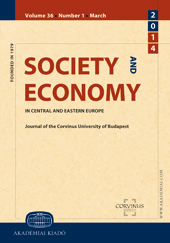Fiscal policy in the EU in the crisis: A model-based approach with applications to new EU member states
Fiscal policy in the EU in the crisis: A model-based approach with applications to new EU member states
Author(s): István P. Székely, Werner Roeger, Jan in 't VeldSubject(s): Supranational / Global Economy, Economic policy, EU-Accession / EU-DEvelopment, Public Finances, Fiscal Politics / Budgeting
Published by: Akadémiai Kiadó
Keywords: fiscal policy; monetary policy; fiscal multiplier; collateral constraint; DSGE modelling;
Summary/Abstract: This paper uses a multi-region DSGE model with collateral constrained households and residential investment to examine the effectiveness of fiscal policy stimulus measures in a credit crisis. The paper explores alternative scenarios which differ by the type of budgetary measure, their length, the degree of monetary accommodation and the level of international coordination. In particular we provide estimates for New EU Member States where we take into account two aspects. First, debt denomination in foreign currency and second, higher nominal interest rates, which makes it less likely that the Central Bank is restricted by the zero bound and will consequently not accommodate a fiscal stimulus. We also compare our results to other recent results obtained in the literature on fiscal policy which generally do not consider credit constrained households.
Journal: Society and Economy. In Central and Eastern Europe ǀ Journal of the Corvinus University of Budapest
- Issue Year: 33/2011
- Issue No: 3
- Page Range: 595-618
- Page Count: 24
- Language: English

